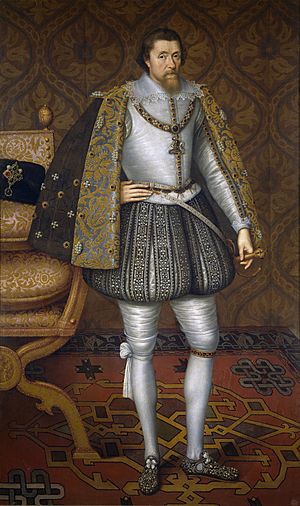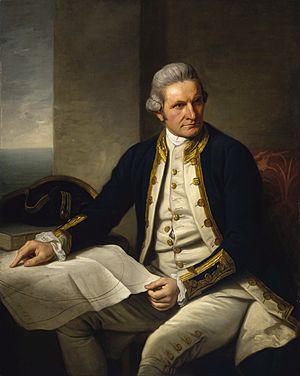Kingdom of Great Britain facts for kids
Quick facts for kids
Great Britain
|
|||||||||||
|---|---|---|---|---|---|---|---|---|---|---|---|
| 1707–1801 | |||||||||||
|
Anthem: God Save the King/Queen
|
|||||||||||
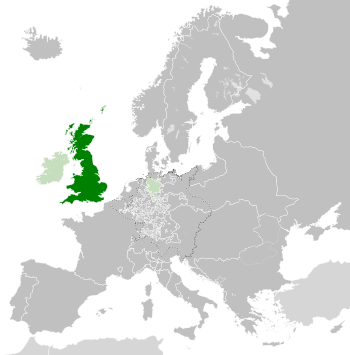
Location of Great Britain in 1789 in dark green; Ireland and Hanover in light green
|
|||||||||||
| Capital | London 51°30′N 0°7′W / 51.500°N 0.117°W |
||||||||||
| Common languages | English (official), Scots, Welsh, Scottish Gaelic | ||||||||||
| Religion | Anglicanism, Roman Catholicism, Presbyterianism, Judaism, others | ||||||||||
| Demonym(s) | British, Briton | ||||||||||
| Government | Unitary parliamentary constitutional monarchy | ||||||||||
| Monarch | |||||||||||
|
• 1707–1714
|
Anne | ||||||||||
|
• 1714–1727
|
George I | ||||||||||
|
• 1727–1760
|
George II | ||||||||||
| Prime Minister | |||||||||||
|
• 1721–1742
|
Robert Walpole | ||||||||||
|
• 1742–1743
|
Earl of Wilmington | ||||||||||
|
• 1743–1754
|
Henry Pelham | ||||||||||
|
• 1757–1762
|
Duke of Newcastle | ||||||||||
|
• 1766–1768
|
William Pitt the Elder | ||||||||||
|
• 1770–1782
|
Lord North | ||||||||||
|
• 1783–1800
|
William Pitt the Younger | ||||||||||
| Legislature | Parliament of Great Britain | ||||||||||
| House of Lords | |||||||||||
| House of Commons | |||||||||||
| History | |||||||||||
| 22 July 1706 | |||||||||||
| 1 May 1707 | |||||||||||
| 1 January 1801 | |||||||||||
| Area | |||||||||||
| Total | 230,977 km2 (89,181 sq mi) | ||||||||||
| Population | |||||||||||
|
• 1707
|
7,000,000 | ||||||||||
|
• 1800
|
10,500,000 | ||||||||||
| Currency | Pound sterling | ||||||||||
| ISO 3166 code | GB | ||||||||||
|
|||||||||||
| Today part of | |||||||||||
The Kingdom of Great Britain, often just called Great Britain, was a country in western Europe. It existed from May 1, 1707, to December 31, 1800. This new country was formed by the Treaty of Union in 1706 and the Acts of Union 1707. These acts joined the separate kingdoms of England (which included Wales) and Scotland. The new kingdom covered the entire island of Great Britain and its nearby islands, except for the Isle of Man and the Channel Islands.
Before 1707, England and Scotland had been separate countries since the 9th century. Wales became part of England in the 16th century. In 1603, something important happened: James VI of Scotland also became King of England, known as James I. This was called the Union of the Crowns. It meant that one ruler, from the House of Stuart, governed both England and Scotland. This same ruler also governed the Kingdom of Ireland.
Even though they shared a king, England, Scotland, and Ireland each kept their own parliaments and laws. The king also ruled over smaller islands like the Isle of Man and the Channel Islands.
The early years of Great Britain saw some rebellions by supporters of the Stuart family, called Jacobites. These rebellions ended when the Jacobites were defeated at the Battle of Culloden in 1746. In 1763, Great Britain won the Seven Years' War. This victory helped the British Empire become the most powerful global force for over a century. It slowly grew into the largest empire in history.
The Kingdom of Great Britain was replaced by the United Kingdom of Great Britain and Ireland on January 1, 1801. This happened because of the Acts of Union 1800.
The first British Empire mainly included lands in North America and the West Indies. It also started to have a presence in India. Many people from Britain moved to the Thirteen Colonies and the West Indies. Some also went to Newfoundland and Nova Scotia. Few British people settled permanently in British India, but many young men went there hoping to get rich and then return home.
Great Britain in the 18th Century
In 1688, England and the Netherlands made peace and became allies in the Nine Years' War. This war was fought in Europe and overseas between France, Spain, and the Anglo-Dutch alliance. After the war, England became a stronger colonial power than the Dutch. The Dutch had to spend a lot of money on the war in Europe. The 18th century was a time when England (and after 1707, Britain) grew to be the world's leading colonial power. France became its main rival.
In 1700, Charles II of Spain died. He wanted Spain and its empire to go to Philippe of Anjou, who was the grandson of the King of France. This raised fears that France, Spain, and their colonies might unite, which Britain and other European powers did not want. So, in 1701, Britain, Portugal, and the Netherlands joined forces with the Holy Roman Empire against Spain and France in the War of the Spanish Succession. France and Spain lost this war, which ended in 1714.
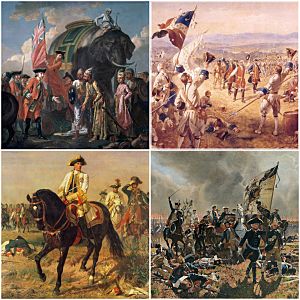
At the end of the war, with the Treaty of Utrecht, Philip gave up his claim to the French throne. Spain lost its empire in Europe. While it kept its empires in the Americas and the Philippines, Spain became much weaker. The British Empire gained new lands. From France, Britain got Newfoundland and Acadia. From Spain, Britain gained Gibraltar and Minorca. Gibraltar is still a British overseas territory today. It became a very important naval base, allowing Britain to control the entry and exit points to the Mediterranean.
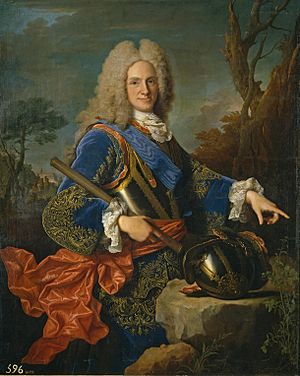
A key goal for Queen Anne (who ruled from 1702 to 1714) was to bring Britain closer together politically. She was the last Stuart monarch of England and Scotland, and the first monarch of the Kingdom of Great Britain. Under Queen Anne and her advisors, a Treaty of Union was created. Talks between England and Scotland began in 1706. The Acts of Union were approved in 1707. This united the separate parliaments and crowns of England and Scotland, forming the Kingdom of Great Britain. Queen Anne officially became the first ruler of the united British throne.
The Seven Years' War started in 1756. It was the first war fought all over the world. Battles took place in Europe, India, North America, the Caribbean, the Philippines, and along the coast of Africa. The Treaty of Paris (1763) had big effects on Britain and its empire. In North America, France's role as a colonial power ended. France gave New France to Britain and Louisiana to Spain.
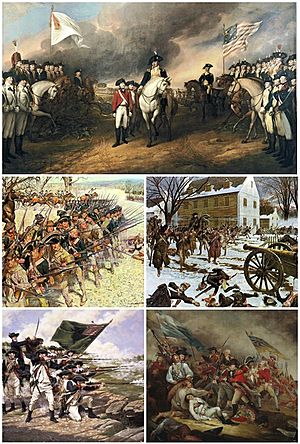
Spain gave Florida to Britain. In India, the Carnatic War meant France still had its small areas but with military limits. France also had to support British-allied states. This left Britain in control of India's future. So, Britain's victory over France in the Seven Years' War made Britain the world's most powerful colonial nation.
During the 1760s and 1770s, relations between the Thirteen Colonies in America and Britain became very tense. The main reason was that American colonists did not like being taxed by the British Parliament without their agreement. Disagreements turned into fighting, and in 1775, the American Revolutionary War began. The next year, the colonists declared the independence of the United States. With help from France, they won the war in 1783.
Historians see the loss of the United States, which was Britain's most populated colony at the time, as a turning point. It marked the shift from the "first" to the "second" British Empire. Britain started focusing less on the Americas and more on Asia, the Pacific, and later Africa. For its first hundred years, the British East India Company focused on trade, not building an empire in India. But in the 18th century, the company became more interested in controlling land.
The Battle of Plassey saw the British defeat the French and their Indian allies. This gave the East India Company control of Bengal and made it a major military and political power in India. Over the next few decades, the company slowly took control of more territories, either directly or indirectly.
In 1770, James Cook explored the eastern coast of Australia during a scientific trip to the South Pacific. In 1778, Joseph Banks, a botanist who traveled with Cook, told the government that Botany Bay would be a good place for a prison colony. In 1787, the first ship of convicts sailed, arriving in 1788.
As the 19th century began, Britain faced a new challenge from France, led by Napoleon. Not only was Britain's place in the world threatened, but Napoleon also planned to invade Britain itself. This would have led to a similar fate as other European countries his armies had conquered.
So, Britain spent a lot of money and resources to win the Napoleonic Wars. The Royal Navy blocked French ports and won a major victory over the French fleet at Trafalgar in 1805.
Images for kids
-
1740 political cartoon depicting a towering Walpole as the Colossus of Rhodes.
-
Lord Clive of the East India Company meeting his ally Mir Jafar after their decisive victory at the Battle of Plassey in 1757
See also
 In Spanish: Reino de Gran Bretaña para niños
In Spanish: Reino de Gran Bretaña para niños
 | Jewel Prestage |
 | Ella Baker |
 | Fannie Lou Hamer |




